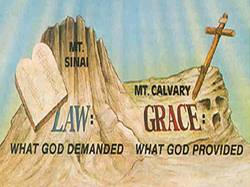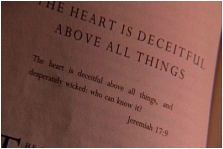
At a time when carefully preserved copies of Magna Carta are in the news we observe that these verses contain Paul’s Magnificent Charter of Freedom for those who have faith in Jesus Christ.
He is reissuing its contents to a congregation of wayward believers who foolishly choose to live under the law (human obedience) as the means of gaining divine approval and acceptance. They fail to see that such an attitude nullifies the gospel that put them right with God in the first place. It is a stunningly serious lapse in understanding and endeavour. To some extent the church in every era is imitative. It is so easy to fall prey to legalism corporately and individually.
In the matter of human salvation there are two options: the law and futile effort, or the grace of God in Jesus Christ. Inevitably the sinful, self-sufficient bias in human nature tends to prefer the former.
Paul writes to the Galatians with dismay: they have selected the law as the path to salvation. It is a potentially fatal fall if they fail to see their grave mistake. He points to the consequences and reminds them of their status and privilege as children of God. It was Thomas Chalmers who sagely remarked that much of their time Christians are living below their privileges.
Paul seeks to awaken the Galatians with a telling comparison from actual and ancient history. He traverses the trail of time back to the Father of Israel, the progenitor of the People of God – Abraham. He bases his case on Genesis 16 and the account of the birth of Ishmael to Hagar. “So Hagar bore Abram a son, and Abram gave the name Ishmael to the son she had borne. Abram was eighty-six years old when Hagar bore him Ishmael” (v15).
Law and grace are represented by two women – the slave woman and the free, namely, Hagar and Sarah. Their offspring, Ishmael and Isaac respectively, were stark opposites. Hagar’s son was born in the ordinary way. Sarah’s was born by the supernatural intervention of God according to the promise pertaining to the coming of the Saviour. The women and their sons stood for two covenants. One, the natural way to God through human moral obedience of heart and behaviour – a useless way now that man was sinful and incapable of the law’s perfection, and the other, reunion with God through the special seed or descendant of Abraham who would free us from the slavery of sin, and wasted effort to deal with it, and bring us back to God by grace alone through his accomplishment on our behalf.
For Paul the distinction is clear. The choices are spiritual, either servitude to Sinai’s demands amounting to sinless perfection, or salvation through Jerusalem’s solution – freedom in Christ and citizenship of heaven.
We have the “impossible opportunity” – because it is a spiritual matter – to opt for our spiritual mother, either Hagar the earthbound way of enslavement and death, or Sarah and liberation from work’s righteousness to life in the power of the Spirit (justification by faith and renewal though the Spirit). The latter way is the sole way of deliverance from sin and futility.
By grace, Paul says to the believers of Galatia, you are children of promise living beneath your privileges. You are no longer to live in the ordinary way of nature, and those who do so are at odds with you. There is a vast chasm between the converted and the condemned. Nature is blind to God and insensible to the things of the Spirit (1 Corinthians 2:10-16) . Nature has no true estimate of its predicament and spiritual poverty. Nature exists in the realm of sight and sense, the visible, the tangible, and all that impinges upon the spirit of man from the natural understanding of the mind of man. Your life in Christ places you on a higher plane of new awareness wherein you are influenced by the Holy Spirit and you are granted a foretaste of heaven, fellowship with God in anticipation of the Jerusalem above.
Paul might add, you are not compatible with the ungodly children of Hagar: they are at war with the free because their thoughts are alien and they do not understand them. Their convictions are disconcerting because they clash with their values and pleasures. Therefore there is friction in worldly society for believers and there is also friction in the fellowship for believers.
The natures of Hagar and Sarah are at variance. One is wedded to law and the other welded to grace. Legalism is oppressive and offended at grace. It cherishes performance above the promise. Sarah foresaw the coming conflict: “But Sarah saw that the son whom Hagar the Egyptian had borne to Abraham was mocking [the celebration of Isaac, v8]” (Genesis 21:9).
Paul, in offering very direct and plain advice to the Galatians, takes up the anguished speech of Sarah, “‘Get rid of the slave woman and her son, for the slave woman’s son will never share in the inheritance with the free woman’s son.’ Therefore, brothers, we are not children of the slave woman, but of the free woman.” (vv30-31). He is saying, quit the law utterly and absolutely – the “do it yourself” way to God and the Jerusalem above, and be what you are, children of the free, not that you are free to sin, but to gain the righteousness of God in Christ Jesus.
We can never gain righteousness through the law – the way of human obedience and rectitude through human effort. That is fruitless slavery through a non-effective pattern of procedure. It is blighted by original and ongoing sin in manifestations we are not able to trace and which only God himself may discern in his majestic and uncompromised holiness. The sinner does not see himself as he ought, therefore he has no measure of his condition, culpability, and unavoidable condemnation. The unawakened sinner is quite pleased with himself with no sense of the displeasure of God.
Freedom from the bondage and helplessness of sin is found in the Promise of which Christ is the embodiment, fulfilment, and applicator. He impresses the stamp of the letter “P” upon the foreheads of his own people with his own thumb. “It is for freedom that Christ has set us free. Stand firm, then, and do not let yourselves be burdened again by a yoke of slavery” (ch5 v1).
Through him we get rid of the slave woman and her son. They get no inheritance from God. In Jesus and through Jesus we inherit all the blessings of God for all eternity. His favour is free and we are free in him, finding rest in him. An incomparable, immeasurable prospect is ours through trust in the One who fulfils the oath sworn to Abraham (Benedictus).
RJS


 RSS Feed
RSS Feed
